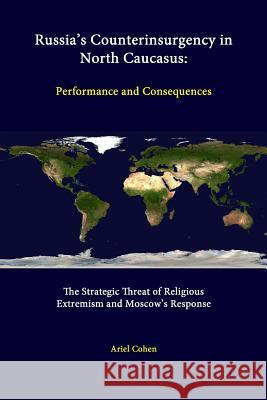Russia's Counterinsurgency in North Caucasus: Performance and Consequences - the Strategic Threat of Religious Extremism and Moscow's Response » książka
Russia's Counterinsurgency in North Caucasus: Performance and Consequences - the Strategic Threat of Religious Extremism and Moscow's Response
ISBN-13: 9781312278127 / Angielski / Miękka / 2014 / 110 str.
Russia's Counterinsurgency in North Caucasus: Performance and Consequences - the Strategic Threat of Religious Extremism and Moscow's Response
ISBN-13: 9781312278127 / Angielski / Miękka / 2014 / 110 str.
(netto: 75,85 VAT: 5%)
Najniższa cena z 30 dni: 78,98
ok. 16-18 dni roboczych.
Darmowa dostawa!
The North Caucasus has been a source of instability for Russia ever since the Russian Empire brought the region under its control in the course of the late-18th and the first half of the 19th centuries. General Alexei Yermolov, a top Russian commander in North Caucasus, used inhumanely harsh methods to conquer the region and retain it under the Romanov crown's control. Hundreds of thousands were ethnically cleansed, and many civilians murdered. In the Russian Civil War (1918-21), which took place right after World War I, the North Caucasus became a victim of both the tsarist White Army and the communist Red Army, who plundered the region and refused to give its peoples the rights they hoped to regain after the war was over. A little over 2 decades after that, the North Caucasus nations faced merciless deportations as a result of imaginary crimes they allegedly committed against the Soviet Union during World War II.
The North Caucasus has been a source of instability for Russia ever since the Russian Empire brought the region under its control in the course of the late-18th and the first half of the 19th centuries. General Alexei Yermolov, a top Russian commander in North Caucasus, used inhumanely harsh methods to conquer the region and retain it under the Romanov crowns control. Hundreds of thousands were ethnically cleansed, and many civilians murdered. In the Russian Civil War (1918-21), which took place right after World War I, the North Caucasus became a victim of both the tsarist White Army and the communist Red Army, who plundered the region and refused to give its peoples the rights they hoped to regain after the war was over. A little over 2 decades after that, the North Caucasus nations faced merciless deportations as a result of imaginary crimes they allegedly committed against the Soviet Union during World War II.











